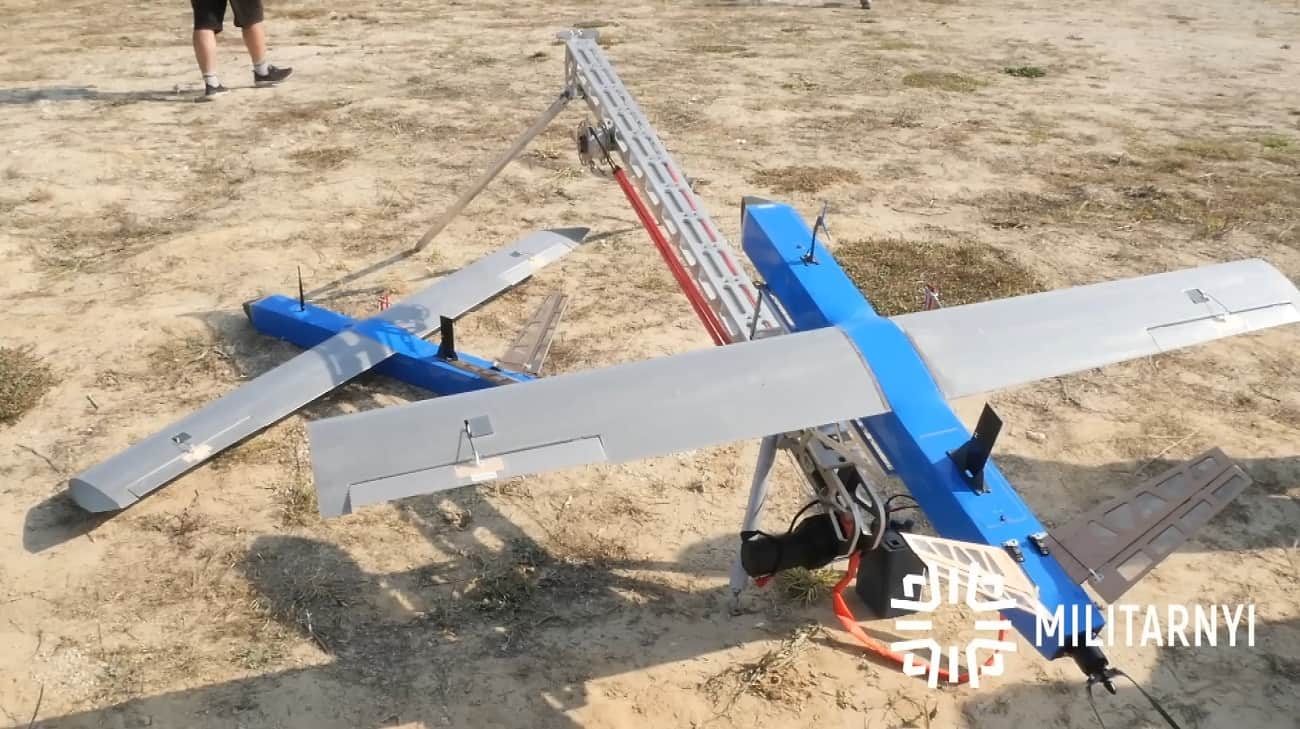An aircraft-type interceptor drone made by Ukrainian company Besomar. Photo: Screenshot from Militarnyi news outlet
Analysts at the Institute for the Study of War (ISW) have observed that Ukraine is making significant progress in developing electronic warfare (EW) capabilities to counter Russian UAVs, which helps preserve limited air defence systems and missiles.
Source: ISW
Quote: “Ukraine continues to successfully adapt and develop its anti-drone capabilities, allowing Ukrainian forces to leverage lower-end systems to offset Russian pressures on Ukraine’s limited air defence umbrella.”
Advertisement:
Details: On 7 September, Ukrainian military analyst Petro Chernyk stated that Ukrainian electronic warfare (EW) systems are effectively disabling Shahed-136/131 loitering munitions by disrupting their navigation, causing them to alter course and eventually crash due to running out of fuel.
Ukrainian officials have revealed that several Russian Shahed drones recently failed to reach their intended targets for unknown reasons. Meanwhile, the Ukrainian Air Force acknowledged on 31 August and 6 September that its EW had affected Russian drones.
Ukrainian drone manufacturer Besomar announced on 7 September that it had developed an interceptor drone capable of bringing down Russian UAVs and that Ukrainian forces were using these interceptor drones in the war zone.
Quote: “ISW has also recently observed reports of Ukrainian forces using first-person view (FPV) drones to down Russian helicopters and reconnaissance and strike drones.
These Ukrainian countermeasures are part of wider efforts aimed at offsetting the pressure that repeated, large-scale Russian strike series exert on Ukraine’s limited air defence umbrella in the face of delayed and inconsistent deliveries of Western security assistance.”
Details: American analysts suggest that Ukraine’s deployment of EW systems against Shahed drones will help conserve the country’s limited air defence systems and missiles. This is especially crucial as Ukraine relies on these resources to defend its frontline positions, critical infrastructure, and densely populated areas from Russian missile strikes.
In addition, ISW continues to believe that Russian and Ukrainian forces are locked in a technological race between offensive and defensive technologies and that Ukraine’s ability to inaugurate technological innovations that outpace Russian adaptations is critical to Ukraine’s ability to offset Russia’s current materiel superiority.
To quote the ISW’s Key Takeaways on 7 September:
- Ukraine’s Main Military Intelligence Directorate (GUR) Head Lieutenant General Kyrylo Budanov noted that Ukraine’s incursion into Kursk Oblast is having theatre-wide impacts on Russian offensive operations in Ukraine and addressed the prospects for continued Russian offensive operations in Winter 2024–2025.
- Iran reportedly recently delivered more than 200 Fateh-360 short-range ballistic missiles to Russia.
- Russian forces recently regained territory and Ukrainian forces recently advanced in Kursk Oblast amid continued Ukrainian offensive operations in the area on 7 September.
- Russian forces recently advanced near Kupiansk, Pokrovsk, and the city of Donetsk and in the Dnipro River Delta.
- Russian officers continue to mistreat and abuse their subordinates likely due to poor command training and discipline.
Support UP or become our patron!

